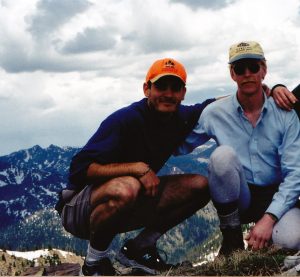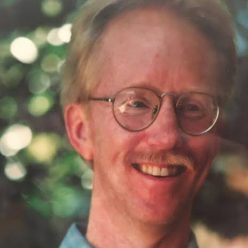By Burke Stansbury
I was in the middle of a week-long RV camping trip when I got the news that my friend Scott Nicholson had died. As we drove back north from California I had a lot of time to think about Scott and how important he was to me at a turning point in my life. Here are a few memories:
had died. As we drove back north from California I had a lot of time to think about Scott and how important he was to me at a turning point in my life. Here are a few memories:
— The fall of 1999, there was a showing in Missoula of Saul Landau’s film about the Zapatistas. I was in college and having studied Latin American politics and spent time in Mexico and Guatemala over the previous two years I was itching to get more involved in solidarity work. It was probably Pamela Voekel or Paul Haber (favorite professors of mine at UM) who told me about the film. At the conclusion of the event a straight-laced guy with a mustache named Scott got up and announced the first meeting of a new Latin America solidarity group in Missoula. Based on his clean-cut appearance and formal, kind of geeky demeanor he wasn’t exactly the person you’d imagine to be leading the revolution… but his passion and determination came through and I was impressed. The meeting ended up being the founding of Community Action for Justice in the Americas, or CAJA, and the organizing work we’d do over the next few years – in solidarity with Salvadoran maquila workers, Colombian human rights activists, the Zapatistas and beyond – was life-changing for me. Through CAJA, I not only got to team up with Scott but also worked with great comrades like Rita Jankowska-Bradley, Erin Thompson Switalski, Ted Morrison, Mo Essen, Leslie MacColman, Gary Graham Hughes and many others.
— In 2000 CAJA organized a tour visit to Missoula with Rafael Coto, a historic leader of the Salvadoran teachers union. It happened right around the time that a campaign to prevent professor and adjunct firings at UM was fizzling. Scott knew Coto from his years living and working in El Salvador as a human rights accompanier during the civil war, and they had a trust and camaraderie that was infectious. After a big public event, a group of CAJistas took Coto out to the Union Club and soon Scott was getting him fired up about the injustice of the pending teacher layoffs. As an educator himself, Coto felt solidarity with the UM professors, and fueled by Scott’s prodding (and a few beers) he started scheming a new campaign to stop the firings.
If I recall correctly we shut the bar down that night, sketching out our plan on the back of a napkin as Coto told stories of teacher strikes in El Salvador during the war. The next day Scott called me up and we went to work, eventually building a coalition, organizing a high-profile protest outside the football stadium, and ultimately helping to stop the worst of the cuts. Of course, Scott always talked how it was a union leader from El Salvador who reignited that campaign, and for him it demonstrated solidarity at its best – a two-way street in which activists in the US could take lessons from our comrades in the South and turn them into organizing victories.
— Maybe it was during that campaign or another campaign the next year to get the University of Montana to divest from Coca-Cola (another Scott brainchild)… but I have a very vivid memory of Scott and I leaving a coalition meeting together and replaying how it went as we walked across campus. I was the actual student rep for CAJA in the meeting (Scott was in his 40s at the time and clearly not a student) so I had been our spokesperson and had done a lot of the talking. The meeting had gone well, and after clarifying some next steps, Scott asked me if I had thought any more about what I wanted to do after graduating. I hemmed and hawed and so Scott broke in. “Have you ever thought about being an organizer?”
A what?!? Even though I had been doing organizing for a couple years by then I still thought of myself as a student activist, and it never occurred to me that I could keep doing what we were doing after college. But Scott persisted. “You were really great in there today. I can see you turning into a leader, and what you’re doing is called community organizing. It’s something you can keep learning and getting better at, and it’s something you can do for the rest of your life… if you want.”
Thus the seed was thus planted. I can still picture exactly where we were when he said it. It’s not all that glorious, but it’s the story I always tell when someone asks me, “How did you decide to become an organizer?”
— Scott had one more brilliant suggestion for me as graduation in 2001 approached: to travel to his beloved El Salvador, work for an organization called CISPES, and learn organizing first hand from some revolutionaries who had been in the trenches for decades. A few months after the organizing conversation he put me in touch with David Amdur, at that time the program director of CISPES, and I applied to be an intern in the San Salvador office. It took a while to come together but eventually I spent a year there and it further transformed my life and set me on the path I’m still on today.
Scott also brought me to my first CISPES convention in the summer of 2001, and came to visit in 2002 while I was living in El Salvador. He didn’t just come to visit me but rather his partner at the time, Isabel, an amazing woman who lives in the mountains of northern El Salvador. The three of us hiked to the top of El Pital, the tallest mountain in the country, and that day I got to see Scott on a triple high: in the country that had been so important to him, doing the thing he loved most aside from activism (hiking), and with the woman he loved. After I returned from El Salvador I went back to Missoula and Scott and I did another beautiful all-day hike together, up to Stuart Peak. The picture here is from that hike, which we both recalled fondly in messages exchanged last week, a few days before he died.
That was also one of the last times I saw Scott in person, and our communication has been sporadic in recent years. Scott wrote to me after Lucas was born, when things were really hard, and he expressed love and support. But he also admitted that he had a hard time understanding what I was going through, because having kids had always been so far from his reality. And frankly, I appreciated that self-awareness and honesty, two things that Scott exemplified. As my former professor and friend Paul wrote last week, Scott was a no-bullshit kind of guy. He said what was in his heart and acted on it. He also knew what he was good at, and not-so good at; he figured out his place in the world and stuck to it.
In the mid-1980s, during one of the bloodiest periods of the US-funded civil wars in Central America, Scott found his way to El Salvador. He put his body on the line to help people return from refugee camps in Honduras – their homes had been destroyed and families killed by US-made bombs, but they were coming back to re-populate their own villages. Scott was moved and inspired by that experience, and he went back to the US and showed pictures and talked to anyone who would listen about the brutal things our country was doing with their tax dollars. Over and over in the decades that followed Scott followed that pattern, bearing witness to war and injustice and putting his body on the line to try to protect people on the frontlines of conflict. He blogged about it from Colombia and sent action alerts from the US-Mexico border, and then he toured around telling deeply affecting human stories, stories that came directly from the people he met, always showing pictures and saying their names. He was damn good at what he did — the most committed organizer I’ve ever know. It’s fair to say that he saved a few lives and changed many, many more for the better.
Que descanse en paz, compa.
